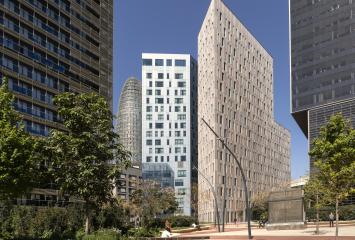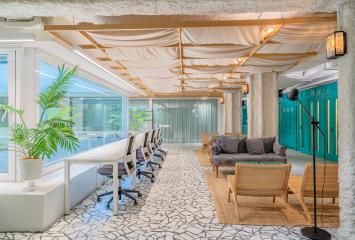Enhancing Biodiversity: Commitment Number 10 of Colonial's Sustainability Decalogue
The accelerated loss of biodiversity, currently occurring at a much faster rate than the historical average, is one of the main concerns for scientists, as well as an increasing concern for governments and society at large. This is why initiatives like the United Nations' Kunming-Montreal Agreement have emerged, aiming to restore and protect 30% of both terrestrial and oceanic surfaces by 2030. However, this commitment must be global, which is why Colonial's Sustainability Decalogue includes the enhancement of biodiversity as a significant moral commitment.
Measures Taken to Enhance Biodiversity
Our commitment to biodiversity materialized in 2017 with the development of a Biodiversity Policy and the creation of a Biodiversity Best Practices Manual. Key points of these initiatives include the creation of new habitats, combating the reduction of species, reducing the heat island effect that affects plants and animals, and minimizing water consumption for irrigation by selecting local plant species with low water requirements, among others. These objectives are not only pursued by us but also by our collaborators: project developers, construction companies, and maintainers.
Specifically, these fundamental principles translate into concrete measures such as the use of native plant species that provide food for pollinators and frugivorous birds, increasing green areas around our office buildings, installing nest boxes for local fauna, constructing insect hotels, implementing green roofs and vertical gardens, and employing sustainable and non-invasive gardening systems. These actions aim to ensure that human presence does not diminish regional biodiversity and can even stimulate it. When a species disappears, it's gone forever. And that should matter to us.
At Colonial, we not only work on implementing conservation measures but also have strategies for monitoring the impact on biodiversity of our buildings and the effectiveness of the measures taken. The work never ends, as life requires constant protection. And it's undoubtedly worth it. Not just because animals and plants were here before us, but also because human civilization relies on all these links in the food chain to obtain the resources it needs. Every link matters, not only in rural but also in urban environments.
Current State of Biodiversity Enhancement at Colonial
Like all the commitments in our Decalogue, the enhancement of biodiversity is represented in our reports as a percentage. In 2019, 40% of our assets had fully implemented measures to care for native flora and fauna. By 2020, that number had increased to 60%, and by 2021, it had risen to 78%. And it continues to climb. One of our priorities is to keep working on increasing the percentage of vertical gardens and green roofs to foster new urban habitats for flora and fauna. The city we envision is green, very green, and we're making it a reality step by step.
Colonial Buildings Exemplifying this Principle
As we approach 2024, nearly all the assets in our portfolio include advanced measures for biodiversity protection. For example, Torre Marenostrum, one of our most iconic buildings, features exclusive habitats for pollinators, the largest green roof among our properties, and plants that attract fruit-feeding birds. At Ciudad de Granada 150, we have planters filled with vegetation that serves as a source of propagules for the surrounding ecosystem. In the Sant Cugat Nord office complex, we've created a butterfly reserve, where up to 41 species of native Mediterranean plants attract and provide food for around 25 different butterfly species. In every case, without exception, we are advised by top ecological experts. Values are crucial, and so is knowledge.

